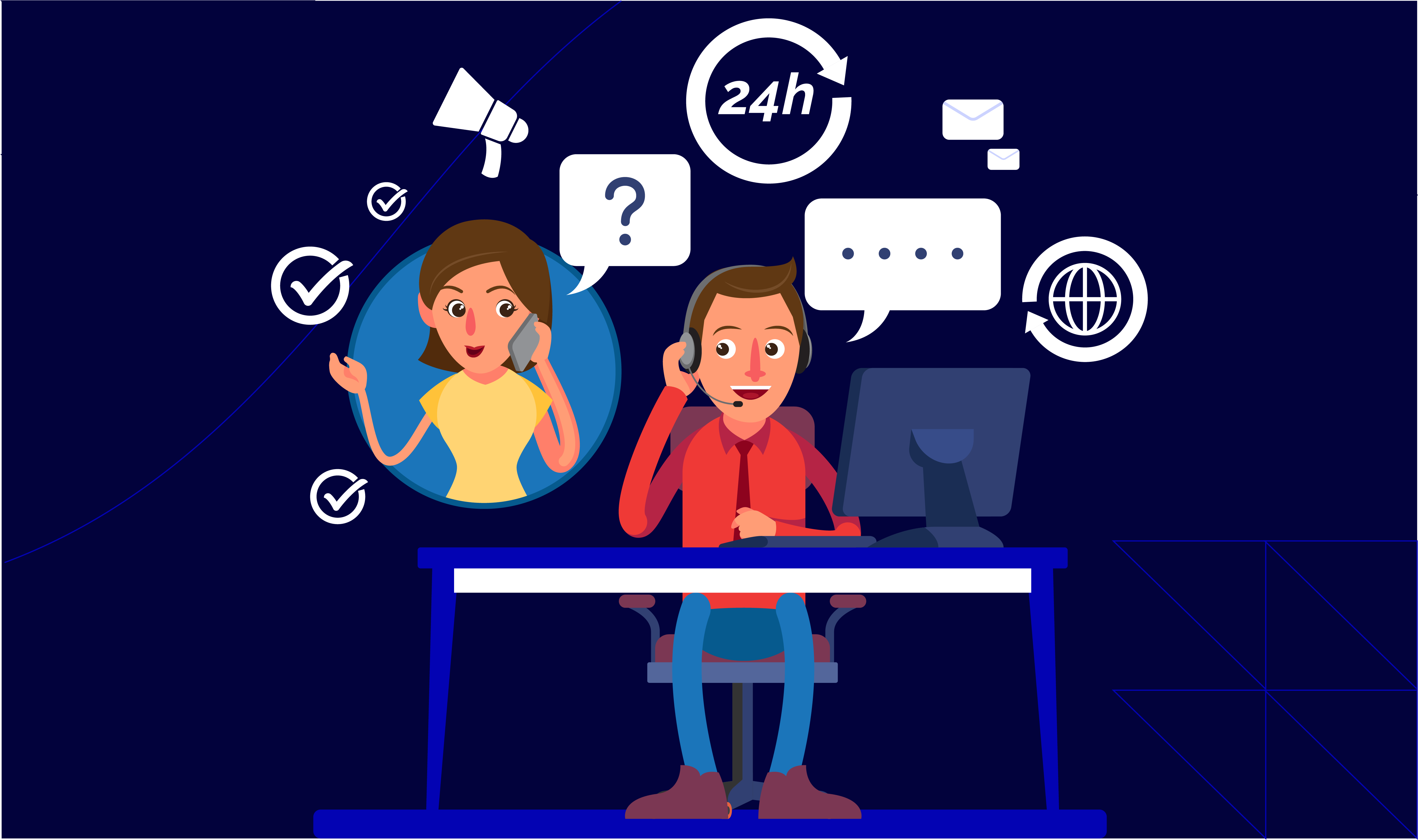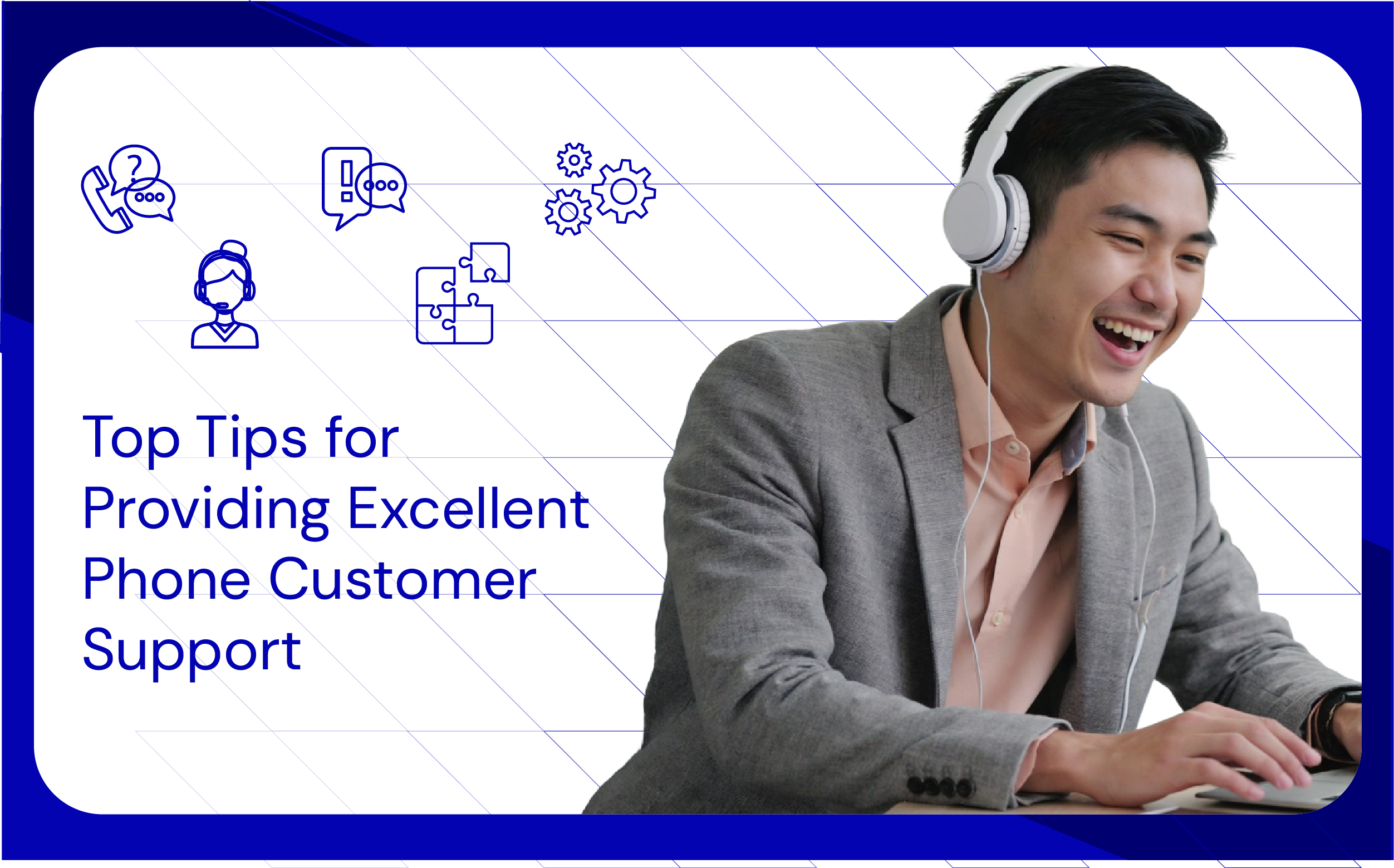Phone support remains one of the most trusted customer service channels, with the highest CSAT ratings. Customer service over the phone is a method in which you offer telephonic support to your customers. It enables real-time and voice-based communication between your customer and your support staff. To improve telephone support, your agents should give fast response, have empathy, clear communication and keep records of each conversation.
It’s the age of texts, DMs, and embedded messaging. But, where does the heart of your customers lie? Studies show that in this digital-first world, more than 50% of customers still prefer phone support.
Reasons? The human touch is what every one needs! The human voice provides:
- Clarity
- Reassurance
- Empathy
- Personalised assistance
- Customer loyalty and satisfaction.
These qualities are often missing in text-based communication. So, is your organisation providing professional telephone support? For consumer brands and D2C companies in the US, UK & Australia, scalable voice support can make or break customer retention.
In this article, let’s study fifteen tips for providing exceptional customer service over the phone. But, firstly let’s begin with its meaning!
What Makes A Good Customer Service Call Over The Phone?

Usually, there are three key components of a good customer service call:
| Understanding the customer’s problem thoroughly |
Resolving the issue quickly and efficiently |
Leaving the customer satisfied and confident after the call |
|
|
|
For CX leaders like VPs, Directors and Senior Managers managing growing customer support teams, this isn’t just about operational metrics. It’s about shaping an experience that directly impacts brand loyalty and repeat purchases.
Studies show that phone support delivers a 91% satisfaction rate, ahead of live chat services for websites (85%). That makes telephone customer service a non-negotiable for brands serious about retention in 2025. So, want your support team to handle customer concerns quickly and directly? The next section lists some proven tips they can follow!
15 Tips to Offer Excellent Customer Service Over The Phone in 2025

Studies show that about 89% of service representatives believe the phone will always be used for customer service. Whereas, about 76% prefer it for complex cases! Thus, we can say that customer on-phone support is here to stay!
Now, your agents should up their game by following these fifteen tips to offer professional customer service over the phone:
1. Answer Calls Quickly
Pick up the phone within 20 seconds, or a few rings. If customers wait too long, they may get upset or hang up! This can lead to losing business.
In high volume environments, consider IVR and smart call-routing tools to avoid long wait times that frustrate callers.
These systems let you sort and direct calls to the right person or department.
2. Start the Call Professionally
Always begin the call by saying your company’s name. A short greeting and a clear introduction show that your business is organised and respectful. Ensure the tone is confident but approachable.
Also, while delivering customer service over the phone, your agents should speak in a clear and polite tone. This approach lets the customer know they are ready to help!
3. Listen Carefully
Let the customer explain their issue completely before replying. Particularly, focus on:
- What they say
- How they say it
- What they might be feeling
Encourage agents to practice active listening such as mirroring key points back to the caller and acknowledging emotions.
This allows you to understand the real problem. Also, repeat key points to confirm you understood them correctly. For example, “So you’re saying…” or “Let me confirm I got this right…”
This avoids confusion while offering customer service over the phone and makes the customer feel heard.
4. Speak Clearly and with Confidence
Talk in a plain language that builds trust. Avoid technical terms unless the customer is familiar with them. Also, speak loud enough to be heard and make sure there is no background noise.
Always remember that a “confident tone” shows the customer on phone that:
- You understand their problem
- Know how to handle it
5. Show That You Understand the Customer’s Feelings
If a customer is upset or confused, say something that shows you understand their emotions. Empathy is a retention driver, not just a courtesy.
For example, your agents can say:
- “I can see this has been frustrating”
- “I’m sorry this happened. Let’s work on it”
This shows the customer on the phone that you care about their situation (not just the problem). It calms them and makes it easier to resolve the issue.
6. Ask the Right Questions
While delivering customer service over the phone, start with asking open-ended questions. Say, “Can you explain what happened?”. Now, the customer can give full details. This allows you to understand the issue quickly.
Next, when you need specific details (like an order number), use yes-or-no or short-answer questions. Also, don’t ask too many questions at once as it makes the customer feel uncomfortable.
7. Stay Positive
When you talk to a customer:
- Stay calm
- Use polite and positive words (even if the customer is upset)
- Avoid terms like “can’t” or “impossible.”
This approach keeps the conversation moving in a better direction. Also, when your agents maintain a helpful and respectful tone, it shows the customer that:
- Your business takes their concerns seriously
- You are focused on solving their problems (not creating more issues).
8. Avoid Jargon
Don’t use technical words or business terms that customers may not understand. Most customers only want their problem solved. If you must mention a feature or service, explain it in simple words.
For example, instead of saying “VoIP,” say, “This feature lets you take calls even when you’re not in the office.”
By using simple language, your customers can:
- Follow the conversation
- Understand the solution
- Feel more comfortable while speaking with your team
9. Take Responsibility
When mistakes happen, own them. Transparency builds trust faster than deflection. Say clearly what went wrong and that you are working to resolve it.
For example, “I see that we missed something on our end. I’m sorry for the trouble. Let me fix it now.” Admitting an error while delivering customer service over the phone, shows honesty and builds trust.
10. Provide Clear Solutions
Once you understand the problem, explain what you will do to resolve it! Ideally, you should:
- Give simple steps and walk the customer through each one
- If there is more than one way to solve the issue, offer choice, let the customer choose (after explaining the options)
Also, tell the customer on the phone, how long the solution may take. Always remember that clear answers avoid confusion.
11. Follow-Up After the Call
After solving the issue, contact the customer again to make sure everything is fine.
This can be done by:
- Phone
- Text message
A follow-up shows you care about the customer, not just the problem! Also, checking back confirms that the customer is satisfied. Studies show that most customers remember when a business follows up. It usually leads to:
- More repeat business
- Positive word-of-mouth
A quick text or email check-in shows commitment. Brands that follow up see higher repeat purchase rates.
12. Keep Records of Customer Calls
Write down details of each customer call (cover the problem and what was done). This lets you or your team know what happened earlier if the customer calls again. Such a recording saves time because the customer doesn’t need to repeat everything!
Additionally, keeping records helps with:
- Training
- Quality checks
- Follow-ups
13. Use Call Summaries
At the end of each call, take a moment to repeat:
- What was the customer’s problem?
- What solution was agreed on?
This approach confirms that both sides understand the same thing. It also allows the customer to ask questions before ending the call (which reduces the chance of confusion later).
14. Balance Both Speed and Attention
Most customers do not like waiting or spending too much time on calls. Also, about 45% of consumers want their issues resolved in the first interaction.
Thus, while delivering customer service over the phone, you should:
- Start the conversation with a clear focus.
- Avoid unnecessary small talk.
- If a problem takes time to resolve, tell the customer how long it might take.
- Be honest about delays.
But at the same time, do not rush the customer! Make sure they feel heard. The key here is to balance both speed and attention. Well-trained teams handle peak volumes smoothly.
15. Master Your Phone System
Train your agents on how to use all parts of your business phone system. They must know how to:
- Transfer calls
- Put someone on hold
- Set up three-way calls
This lets your team handle customer calls without mistakes or delays. To do so, you can start using a good phone system. Alternatively, you can avail of voice customer support services offered by leading agencies like Atidiv. Such outsourcing can even help you achieve up to 60% cost reductions compared to running in-house teams.
Customer Service Performance Benchmarks Your Team Can Follow in 2025
As per the industry standards, the basic goal across the industry is to answer 80% of all calls within 20 seconds. To enhance the efficiency of your agents, you can provide them with these established performance benchmarks:
| Performance Benchmarks | Explanation |
| Call Answer Speed |
|
| Average Handle Time (AHT) |
|
| First Call Resolution (FCR) |
|
| Call Abandonment Rate |
|
| Agent Occupancy Rate |
|
For CX leaders in consumer brands and D2C sectors, tracking these KPIs helps align customer service performance with revenue outcomes.
Want to Delight Every Caller? Outsource Your Customer Support To Atidiv!

Customers still prefer hearing a real voice! Phone support is still the most human channel in CX and it’s often the one that decides whether a customer stays or churns.
Studies show that customer service over the phone still has the highest CSAT rate. This makes phone support a critical touchpoint! To improve, your agents can follow these tips:
- Active listening
- Minimum resolution time
- Avoiding jargons
- Keeping proper call records
- Making call follow-ups
Are you struggling to deliver memorable customer experiences? Outsource your customer support to a CX specialist like Atidiv! Our expert team offers:
- Omnichannel messaging solutions
- Voice customer care
- Back office support services
- Social media support
- Live chat service for website
- Call center business outsourcing
- Inbound call center services and outbound call center services
At Atidiv, we help D2C companies in the US, UK & Australia deliver exceptional telephone customer service by combining:
- 24/7 omnichannel coverage (voice, chat, email, social)
- Voice customer care with speech analytics for faster resolution
- Scalable teams that reduce costs by up to 60% compared to in-house operations
- Retention-focused training to ensure empathy, clarity, and brand alignment
Additionally, for inbound sales, Atidiv uses smart call routing and speech analytics. This ensures your customers can reach the right agent quickly! If you’re a VP, Director or Senior Manager in Customer Experience, and you want to transform phone support into a competitive advantage partner with Atidiv and scale smarter.
FAQs on Customer Service Over the Phone
1. Why do my customers hang up before speaking to an agent?
Customers usually hang up because of long wait times or unclear IVR menus. To resolve this problem:
- Instruct your agents to answer calls within 20 seconds
- Simplify your IVR system’s menu
Alternatively,
Optimized call routing or outsourcing to a CX specialist like Atidiv solves this. We offer 24/7 availability and faster response times.
2. How can I reduce repeat calls from the same customer?
Usually, repeat calls happen when your agents don’t fully understand the issue the first time. In such a case, you should focus on First Call Resolution (FCR). Train your agents to:
- Listen well
- Explain solutions clearly
- Follow up when needed
Also, try to keep call records. It lets you avoid repeated explanations.
3. My team struggles with high call volumes. What should I do?
High call volumes can overwhelm small teams. As a solution, you should scale by using call routing tools or outsource to Atidiv’s expert teams with CX specialists.
We provide exceptional customer service over the phone by using smart technology. Also, our trained agents can easily handle call volume spikes (without compromising quality).
4. What’s the best way to train my agents for better customer service over the phone?
You must train your agents to:
- Speak clearly
- Maintain a confident tone
- Listen actively
- Stay calm under pressure
- Use positive language
Also, teach them how to use tone, empathy, clarity and system mastery. These efforts ensure your agents are always performing at their best!

